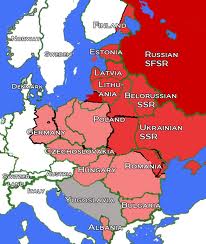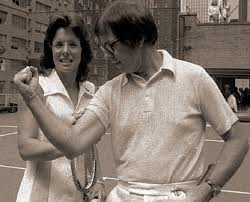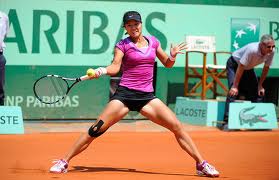WTA keeps
women in the picture

I remember reading a few years back, when there were only a few Eastern European female players on the WTA professional circuit, reading an interview from one of the top Russian females. The interviewer asked quite innocently why Russian women were becoming more and more present in the pro game. The player replied, quite frankly, that " in Russia if you're a girl you have a choice, become a prostitute, or become an athlete." This is surely an exaggeration, but as with all exaggerations, one with some truth behind it.The position of women in any society determines how strongly these women act in certain fields.

Eastern Bloc dominance
As in the men's game, the beginning of WTA professional tennis is quite recent, officially founded by Billie-Jean King in 1973, an organisation that had already unofficially organised some "pro only" events in the preceding years. The experiment succeeded, and the WTA was created to put in place a year long sequence of events for a group of players who through carrot and stick approaches, but mostly carrot, money, were encouraged to play a high number of events around the world every year. In the early days many, especially men of course, suggested that the WTA would never take off, because women were less interesting, less high-performing, sports people. There was, and is, some statistical proof behind this, and at the outset women's prize money was barely a third of that of men. Today, out of principle, many tournaments are trying to offer identical prize money to women as to men.

Battle of the sexes
For a while the women competing had difficulty in deciding what professional status really meant, since many of the top women had been earning money, of sorts, for many years. We also mustn't forget that most tournaments had an additional fund associated with the prize money, to ensure that the players were housed, fed and transported during the tournament. This was clearly not prize money, but many tournaments also had "pocket money" for any competing player, that was dependent on how many days you were on the site, and nothing to do with how much you won or not. This was a sort of retainer, a way of keeping a good player at the tournament venue for as long as possible. The players shouldn't just fly home after a defeat because they had nowhere left to sleep and eat.
These costs had been covered at many tournaments for many years. There were indeed many players who, as long as they stayed fit and healthy, didn't worry about prize money too much. As long as all of their daily expenses were met, they needed no cash at all, so their livelihoods were assured, even through a bad run of form. This is how the WTA, and of course the ATP, work. The players receive certain guarantees, for a certain period. They should suffer no real financial hardship during this period. If they fail to kick on from this assured tournament circuit, then surely at some time they'll abandon the idea of making serious money, and just drop off the circuit.
For the great players, those with winning potential, the rewards were great. An opportunity to become very rich, first through prize money, and second through personal sponsorships of various kinds, but also the possibility of being recruited for a top job after the playing career was over - as a coach, administrator, or business person.

Professional Lady
There are some who argue that the WTA, quite similar to the ATP, actually over-protect their players. Let's say that a pro has a good tournament. He earns some ranking points, and then he has a year to defend these points. This is effectively a year on the road, playing one tournament after another, maybe not practising as much as he did, because now so much of his time is taken up by travelling and playing.
On the downside, that means that if he wins nothing in the ensuing year, and in that same week in the following year has a poor tournament, he'll be back where he started, and have to struggle up the rankings from a low level again. What is remarkable is that this doesn't happen much. Which just goes to show that the WTA is a great concept. When a player has a good tournament, there is no reason to assume that she won't continue to make progress in the months to come. Most do, and become an asset to the tour, giving it greater playing depth, and greater commercial possibilities. Most sports are organised in this way, and the model works.

Togetherness
You then have the situation where an exceptional talent like Sharapova will win substantial prize money as a teeenager, and due to her marketability, makes more in endorsements than she does from playing. All she has to do is prolong her career so that she remains in the public eye as a player, and that endorsement money will continue to flow.If she continues to win, then she'll just get richer from both income sources.

Front cover
So the WTA is an amazing thing. It has, just since three generations, taken women from accessories in the world game, to, theoretical equals, in particular because the marketability of women is quite different from the men, and in some cases can be more lucrative.

Ongoing campaign
My interest though is my original comment, that women, from many countries, come into the game with a different motivation than men. Can it really be that women from the old Eastern Block only reached these heights because the alternative was too terrible? Can that be the reason why they hit more practise balls, with more determination to get on the WTA tour, than a counterpart in Britain, or France, or in the USA, or Australia?
There's another issue too. Becoming a pro player costs money and needs resources - courts, coaches and equipment, and a fund to pay for costs. Can it really be that a country like Russia had all of this in place, in addition to high player motivation, that enabled these players to succeed?
The answer is of course they did. The Eastern Block had had an enlightened attitude towards sport since the end of the Second World War, linked partly to the military machine, the need to make its population fit and healthy, but also an effort to compete with sports standards seen in the USA, at that stage the dominant country in world sports. The detection of sporting talent started in schools, and specialised coaches would take, force, this talent into specialised training centres, combining sport and studies for years. Although many fell by the wayside, many top sportswomen arose out of this system.

As good as men
What was a country like UK doing while Russia was training its athletes? UK, possibly the originators of the game as a world popular sport. There the game was entrenched in its roots - a social game played by the richer classes, with no expansion of facilites, no introduction of intensive sport onto the school curriculum, and no training of coaches adapted to a game shortly to turn professional. And when you miss one generation, you can be sure you'll miss the next unless you make an enormous effort. No effort was made.
What is the situation now, after forty years of the WTA?
We have fantastic depth in the women's game, sporting and athletic talent is not only being discovered, but matured to almost the same levels as the men's game. The women's game has no real problems attracting sponsors - sometimes these sponsors are very different from those in the men's game, but they are there, paying out significant money. And why not? 50% of the world population is women, spending 50% of the world's money (technically), so they should be able to attract 50% of the sponsorship. The game has become even more visible, through TV and the media, and the growth of the sport in emerging economies, countries determined to catch up with the lag. They have the resources to catch up, so new women from new countries are using the WTA tour to display their skills. Last year a Chinese woman won Roland Garros. In my youth did anyone at all play tennis in China? What a turnaround!

Identical technique
There is another curiosity. The WTA tour is still dominated by the old Eastern Block countries. Is this women who are choosing tennis over prostitution as a lifestyle? Or, is this their infrastructure and know-how being cleverly maintained, and these countries exploiting the financial potential that the WTA offers?
The girl athletes are clearly in this for the money. Their youth is spent preparing for a lucrative career.
WTA ATP Coach
- ask for him here!
Five of our most popular pages
. tournament win
. finding a sponsor
. the touring pro
. the master at work



